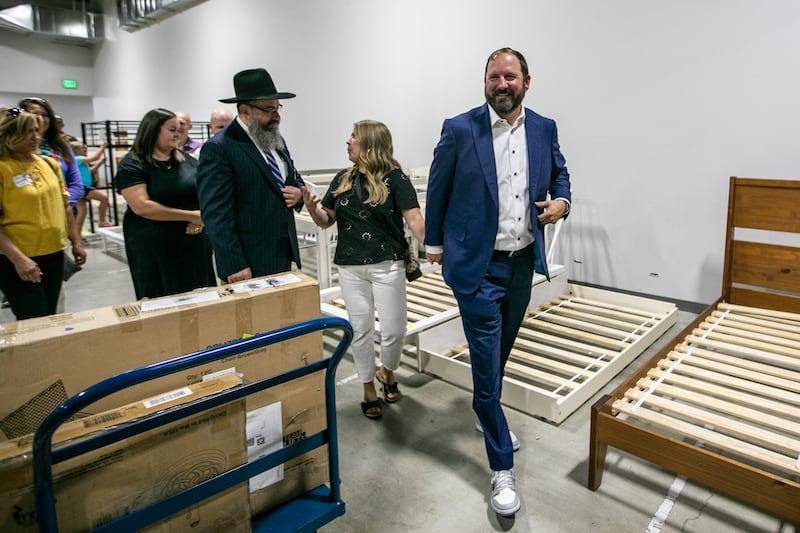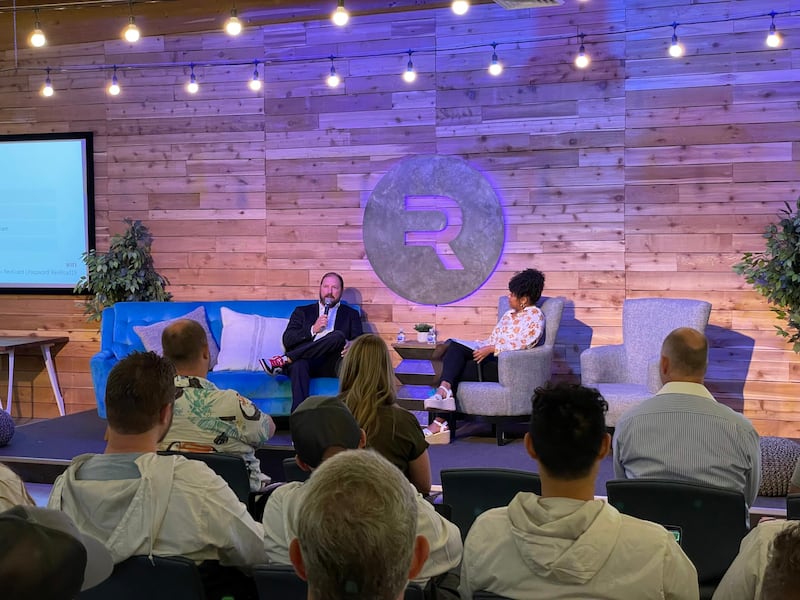Brad Bonham at the Walker Edison grand opening celebration
Iwatched my dad succeed and fail in business while working at his companies in my youth. Conversations around the dinner table were about supplier issues, funding growth and when to move onto a new venture. I don’t remember my dad working for anyone else, so that’s what I thought a career looked like growing up—run some side hustles, get a university degree, maybe work in that field for a few years, and ultimately, start your own business.
As a student at the University of Utah, I studied finance. I made an appointment with my academic advisor to better understand what a career would look like and how much I could expect to be paid. At the time, I had started several side hustles to help pay for my degree, so I had a decent income stream. The advisor enthusiastically informed me that I could anticipate an annual salary of $60K, but I was already making more than that on the side. I realized that if I could focus all my time on these “side hustles,” I could do much better than $60K.
So, I dropped out and jumped into my entrepreneurial path earlier than anticipated—a path filled with unknowns, instability and the unlimited potential that I knew from my youth.
From wheels and watches to wardrobes
During my college years, my side hustles included flipping automotive wheels. I’d find dirty, underpriced and unwanted wheels in the online classifieds. I’d analyze which wheels were trending and selling quickly at a high price point, then sift through the listings until I found wheels that had potential. After purchasing them at a discount, I’d clean them up and resell them at a profit. Never underestimate the potential profit from a set of cleaned-up wheels!
In addition to wheels, I flipped watches. I joined several online watch forums and was fascinated by the market for high-end timepieces. If you’re not ready to become obsessed with the understated world of luxury watches, please skip the following few lines: I created an Excel spreadsheet where I’d track the asking prices of watches in these forums, then scan the online classifieds and find incredible deals on watches that I could purchase and resell for a profit. With that data set, I was virtually assured of making a profit on every watch I bought and sold.
Both ventures put me through school and opened my eyes to the limitless potential of finding a market, capitalizing on the opportunity and growing a business out of it. From wheels and watches, I partnered with my father on a gift basket company punching below its weight. This business was already selling into Walmart and had incredible potential for growth. While on a sourcing trip in Asia, I decided to walk the other exhibition halls. One of the furniture halls was nearby, and as I walked through, I realized that some pieces had incredible potential in the United States. On a whim, I ordered a container of TV stands. No market research. No buyers lined up. No stores with purchase orders—just a feeling that these pieces would sell.
When I got home, I drove to Overstock.com (now Beyond) to meet with their sales team to pitch this new product. When I arrived, the receptionist was at a loss. No one had just shown up before. I’m not sure if it was from shock or if they were genuinely impressed by my bold approach, but Overstock.com gave me the paperwork, and the following week, my product was up on their site. One container became two, and two became much more, and Walker Edison was born.
A tech-first philosophy
My co-founder and childhood friend, Matt Davis, and I spent our early days doing sales, customer service, fulfillment—anything and everything to keep our business open. We always joke that every day could have been our last day in business for the first decade. That joke was probably a little more realistic than either of us care to admit.
I was fortunate enough to have my father as a business partner from the beginning. He brought decades of experience and startup capital to help us get off the ground. None of us knew how to sell furniture online, but we had a unique skill set, a commitment to become e-commerce experts and a bias toward action. We knew this could be incredibly successful if we figured out it.
We bootstrapped Walker Edison for the first decade—not by choice, I might add. We met with investor after investor, and no one could see our company for what it really was. Each investor thought we were simply another furniture company. If I saw it that way, I probably wouldn’t have been interested, either. But the reality is that Walker Edison was a tech company first and a furniture company second. We were a carefully built data machine, and we meticulously analyzed trends in the market before even considering what we would sell. When we took a new SKU to market, we knew exactly who and how to market our products.

Brad Bonham on his entrepreneur-in-residence tour across the state
Over time, we began manufacturing our own furniture and selling it on all major e-commerce sites. We became one of the largest furniture suppliers on Wayfair, Amazon, Walmart.com and many other platforms. As we grew, we decided to shift our business model and open retail storefronts, thinking we could cut out the fees from online marketplaces. What we anticipated would be the future of Walker Edison and boost our profits almost cost us our business. We perfected data analytics for online furniture sales but underestimated the logistical nightmare of transitioning from dropshipping to storefront. This mistake cost us a year of solid growth, but we ultimately recovered and decided to stick with what we knew.
Even with that hiccup, Walker Edison was consistently recognized as one of Utah’s fastest-growing businesses by both Utah Business and Mountain West Capital and a top seller on major e-commerce platforms. Did we sell a great product that met consumer demand? Absolutely! But our secret to growth always came back to data and our incredible team.
A commitment to community and culture
While data was important from the beginning, it wasn’t until we onboarded with Domo and began using their business intelligence tools that we hit our inflection point. Replacing detailed and robust spreadsheets that were manually generated with real-time information at our fingertips was an absolute game changer. At any given time, we could reference our dashboard and know our inventory levels by warehouse, the volume of returns to identify poorly constructed products, online sales conversions by site, the time a customer would spend looking at specific products and more. With this information, we knew how to find our customers and what to sell them with incredible certainty. Our revenues increased more than 20x in just five years after becoming a data-first business.
While data allowed us to pinpoint products and consumer demand, our employees were always our top priority. If our employees were happy and motivated, they were invested in the success of our company. If they were invested, our business grew, and everyone won. We did everything we could to provide our employees with purpose, growth and compensation.
From day one, we felt it was important for our team to give back. We supported the local food bank, neighborhood schools, Make-a-Wish Utah and many other local charities. As our company grew, we kept this as part of our company culture and would offer company-wide service projects and time off for employees to serve in the community. We later identified this as a pillar of our company culture, branding it as WE Give. We had prospective employees who wanted to work at Walker Edison because of this pillar in our company culture. We also wanted to ensure we gave back to our employees and that they knew we valued them beyond a paycheck. During the COVID-19 pandemic, we worked with local small businesses to send monthly gifts to our employees. Since we couldn’t connect in person for a time, we wanted every employee to be able to connect through shared experiences, which included fun local products and unique activities.
Walker Edison grew beyond what we ever could have imagined. We were able to employ hundreds of Utahns locally and hundreds more in Walker Edison offices and warehouses across the globe. We gave back often and in significant ways to the community. We helped our employees grow personally and professionally. We supported other small businesses and celebrated Utah’s economic success.
As Walker Edison continued to grow, we were able to attract top talent and private equity partners, which allowed Matt and I to step back and eventually exit the business. For 16 years, we poured everything we had into building Walker Edison, and it was incredibly rewarding to pass on what we created. In our early days, we were begging for investment to help scale our business, but as we bootstrapped and slowly improved our business model, we found ourselves turning away investment inquiries. One investor told us that our business would amount to nothing, only to call us back four years later, begging to invest in our company. It was honestly one of the most rewarding days as a founder! We didn’t let his criticism deter our success. In fact, we redoubled our efforts to scale Walker Edison no matter the obstacle in our way—and it paid off big time!

Brad Bonham speaking at RevRoad
Shaping Utah’s entrepreneurial landscape
As I transitioned out of Walker Edison, I recognized that having an impact wasn’t confined to what I accomplished inside the business. I was asked by Gov. Gary Herbert to join the Governor’s Office of Economic Development (now GOEO, or Governor’s Office of Economic Opportunity) board and add my entrepreneurship knowledge and experience. This opportunity taught me that government can play a meaningful role in supporting and developing both small and large businesses. While the government doesn’t create companies or jobs, it can create an environment where businesses thrive!
There is nowhere in the world that makes it easier to do business and create an environment for success like Utah. The upside for startups in Utah is unmatched. At any turn, I was able to find mentors, advisors and resources that aided my business. That’s not to say my company didn’t run into barriers along the way (because we hit some major barriers), but the barriers were smaller in Utah and much easier to overcome. We are fortunate in Utah that the government “gets off our back and out of our wallet,” as Gov. Herbert would always say. I am forever grateful for the privilege of starting and growing Walker Edison in Utah.
As the nation’s top economy, the previous administrations’ work has set the stage for an exciting new undertaking that Gov. Spencer Cox has asked me to spearhead. In early 2023, Gov. Cox created a first-in-the-nation role of a state-level entrepreneur-in-residence. With Utah seeing decades of exponential corporate recruitment economic growth, it was time for the state to implement strategic efforts to support our home-grown startups. This doesn’t detract from bringing in new jobs and economic opportunities outside the state but rather levels the playing field by supporting local innovators and entrepreneurs.
As Utah’s entrepreneur-in-residence, I’ve heard from hundreds of startup founders across the state. I’ve heard about their greatest successes, most challenging barriers and biggest failures. Each conversation, coupled with the roller coaster of experiences I’ve had in launching several businesses, has informed our recently announced Startup State initiative. This initiative promotes an entirely new suite of business tools that are being developed by entrepreneurs for entrepreneurs across the state. It expands access to government support for their business and streamlines the process of starting and scaling a business in Utah. Along with GOEO Executive Director Ryan Starks, we will roll these tools out to Utah innovators beginning in 2024. Through this initiative, Utah will be the startup capital of the world!
Just as every entrepreneur will tell you, there is no crystal ball or road map to successfully starting and scaling a business. No matter how diligently you futureproof your business model, there will be unexpected twists and turns along the way. That has been true in every business I’ve started, and it’s been true in designing the state’s startup initiative. But I do know one thing: Utah is the place to be. I feel incredibly fortunate to have started and run multiple businesses in this state, and I hope every aspiring entrepreneur and innovator can take full advantage of what Utah has to offer.

